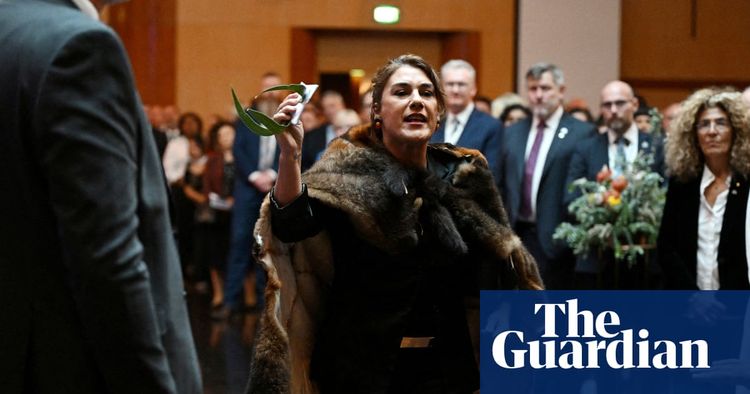With her protest before the king, Lidia Thorpe bursts the warm bubble of nostalgia around the royal visit | Karen Middleton

When Lidia Thorpe confirmed her attendance at the royal reception at Parliament House, it likely became evident to the event organizers that a protest was expected.
Maybe this was the reason the king and queen, along with their guests, came into the Great Hall through a door behind the stage instead of walking directly through the foyer, down the center aisle, and right by where Thorpe, wearing a possum-skin cloak, was already standing at the front of a gathering of MPs.
However, changing operational methods was never going to completely eliminate the underlying issues, just as the visit can't completely remove the feeling that Australia's connection to the monarchy reflects the country’s history more than its future.
Thorpe's remarks are likely to evoke more sympathy for the royal family among Australians who have mixed feelings about the monarchy but still value courtesy to guests. Most of the crowds lining the streets and attending parliament to witness the royals have shown a friendly and sincere welcome, with very few republican signs visible.
That elephant also made its way into the reception area where guests were enjoying champagne and attempting to take clever selfies, though it was a less intense moment compared to the situation referred to as Indigenous sovereignty.
“You have demonstrated a significant regard for the people of Australia, even during periods when we’ve discussed the future of our constitutional framework and our ties with the monarchy,” Anthony Albanese said to the king, subtly hinting at Australia’s ongoing issues. “Things are always evolving.”
Peter Dutton was the only one bold enough to confront the country’s apparent growing desire to break away from the norm, and he did so primarily as a punchline in front of a monarch who clearly appreciates a good joke.
“From this podium, Dutton expressed his hope that the positive feedback received so far, both yesterday in Sydney and today at the War Memorial, has brightened your spirits during this diverse assembly,” he said to the king.
"Individuals have gotten haircuts, polished their shoes, and had their suits ironed. And that's only for the Republicans."
King Charles didn’t mention Australia’s constitutional future at all, even indirectly, which suggests he understands that interest in the topic has diminished significantly.
However, he did touch on a few other matters that have created domestic challenges in Australia and New Zealand. He recognized the clear indications of climate change and the importance of addressing them rather than brushing them aside, commending Australia for "moving towards a more secure and improved future."
In the moments leading up to Thorpe's protest, he recognized what he called the country’s "long and often challenging path to reconciliation." By honoring the wisdom of the First Peoples, he connected these two topics.
“It benefits everyone for us to take care of the planet and to leave a positive legacy for future generations,” he stated. “We are all linked, both to people around the world and to everything that supports life. This is the enduring insight shared by Indigenous cultures everywhere.”
The "terrifying realities of conflict, loss of life, and unnecessary devastation" led the king to announce that "this time in our history calls for both traditional and innovative approaches."
That's definitely the struggle for a king visiting a distant and somewhat uncertain part of his realm, bringing along feelings of nostalgia, understanding, and a hopeful outlook as his means of connection.
On Monday, Lidia Thorpe disrupted the pleasant atmosphere by marching up to the stage and calling for a treaty, all while Albanese and his fiancée, Jodie Haydon, leaned in to whisper in the ears of nearby royals.
Thorpe's protest highlights an important point: although traditions are increasingly being questioned in our society, we still have a long way to go in defining our identity. This journey will likely be much more challenging than simply having one loud and angry voice disrupt a celebration.
Karen Middleton serves as the political editor for Guardian Australia.



















































